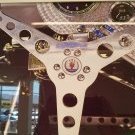-
Available Subscriptions
-
Have you checked out Joe's Latest Blog?
-
By Joe Marconi in Joe's Blog0 commentsIt always amazes me when I hear about a technician who quits one repair shop to go work at another shop for less money. I know you have heard of this too, and you’ve probably asked yourself, “Can this be true? And Why?” The answer rests within the culture of the company. More specifically, the boss, manager, or a toxic work environment literally pushed the technician out the door.
While money and benefits tend to attract people to a company, it won’t keep them there. When a technician begins to look over the fence for greener grass, that is usually a sign that something is wrong within the workplace. It also means that his or her heart is probably already gone. If the issue is not resolved, no amount of money will keep that technician for the long term. The heart is always the first to leave. The last thing that leaves is the technician’s toolbox.
Shop owners: Focus more on employee retention than acquisition. This is not to say that you should not be constantly recruiting. You should. What it does means is that once you hire someone, your job isn’t over, that’s when it begins. Get to know your technicians. Build strong relationships. Have frequent one-on-ones. Engage in meaningful conversation. Find what truly motivates your technicians. You may be surprised that while money is a motivator, it’s usually not the prime motivator.
One last thing; the cost of technician turnover can be financially devastating. It also affects shop morale. Do all you can to create a workplace where technicians feel they are respected, recognized, and know that their work contributes to the overall success of the company. This will lead to improved morale and team spirit. Remember, when you see a technician’s toolbox rolling out of the bay on its way to another shop, the heart was most likely gone long before that.
-
-
Similar Topics
-
By carmcapriotto
In this episode, we’re diving into the powerful concept of creating a shared vision and how a lack of clarity could be holding your shop back from real growth.
I’ll walk you through what I learned in a deep dive after my own leadership team challenged me to cast a vision that reaches every level of our company. We’ll talk about how to get out of the “small thinking” trap, how to define your goals with laser precision, and why your employees need to see, feel, and believe in the same future you do.
Plus, I’ll share real tools, like how to craft your vision statement, how to communicate it across your team, and how to create a business where everyone’s pulling in the same direction.
If you want to stop playing small and start building something truly great, this episode is for you.
Thank you to our friends at RepairPal for providing you this episode. RepairPal will help you grow your auto business and you can learn more at RepairPal.com/shops.
Declined repairs don’t have to be lost revenue. AppFueled’s call center schedules follow-up calls and equips your team with everything they need to close the deal. Get started now at appfueled.com
Lagniappe (Books, Links, Other Podcasts, etc)
EOS One
Vivid Vision: A Remarkable Tool For Aligning Your Business Around a Shared Vision of the Future - Cameron Herold
The Vision Driven Leader - Michael Hyatt
Stop Delaying Your Dreams: Time to Take Action
Show Notes with Timestamps
Introduction and Sponsors (00:00:01) Overview of the podcast and thanks to sponsors RepairPal and App Fuel. Creating a Shared Vision (00:00:10) Brian discusses the importance of establishing a shared vision for the company. Leadership Team Meetings (00:01:13) Details about offsite leadership meetings and the exercise called "the one thing." Feedback and Growth (00:02:08) Brian reflects on receiving feedback from his leadership team and its impact on personal growth. Shifting Mindset on Growth (00:03:07) Brian shares his fears about growth and how he overcame them to embrace larger ambitions. Disney's Service Model (00:04:17) Comparison of Disney's customer service model to his company's approach to client service. Processes and Procedures (00:05:26) Discussion on the importance of processes in maintaining service quality while growing. Inbound Marketing Strategy (00:07:25) Brian explains the effectiveness of inbound marketing in attracting clients. Outbound Sales Shift (00:09:26) Introduction of outbound sales strategies and the team's initial reactions to the change. Creating a Shared Vision Deep Dive (00:10:34) Brian's focus on developing a shared vision after receiving feedback from his leadership team. Researching Shared Vision (00:11:42) Challenges in finding resources on creating a shared vision and discovering related literature. Book Recommendations (00:12:42) Brian reviews two books on vision creation and his thoughts on their content. Simplicity of Creating Vision (00:13:34) Brian concludes that creating a shared vision is simpler than expected, emphasizing clarity. Vision, Mission, and Values Explained (00:14:45) Brian differentiates between vision, mission, and values with a practical example. Big Dreams and Ambitions (00:15:45) Brian discusses the importance of dreaming big and outlines a fictional company's ambitious goals. Vision, Mission, and Values (00:16:48) He explains the significance of having a clear vision, mission, and values for a successful organization. Sponsor Message: RepairPal (00:17:48) Introduction to RepairPal and its services that help auto repair shops attract tech-savvy customers. Sponsor Message: App Fuel (00:18:48) Overview of App Fuel's customer loyalty app designed for auto service shops to enhance customer retention. Core Values and Their Importance (00:19:57) Brian shares his realization of the value of core values in decision-making and company culture. Litmus Testing New Hires (00:20:59) He describes how to evaluate potential hires against the company's vision, mission, and values. Understanding What You Want (00:21:55) Brian emphasizes the importance of defining personal and business desires beyond just financial goals. Creating a Clear Vision (00:23:51) Discussion on the necessity of a detailed, clear vision for a business to guide its direction. Proximity to Your Dreams (00:26:56) Encouragement to immerse oneself in environments that inspire and reflect personal dreams and aspirations. Crafting Your Vision (00:28:50) Brian advises on the process of creating a vision, emphasizing the need for time and space away from routine. The Importance of a Clear Direction (00:29:46) He compares running a business without a clear vision to aimlessly shooting an arrow, highlighting the risks involved. Creating a Target (00:30:41) Discusses the importance of having a detailed vision as a target for business goals. Vision Details (00:31:37) Explains the components of a business vision, including specifics about services and operational metrics. Dream Big (00:34:25) Encourages thinking big without worrying about how to achieve those goals initially. Historical Example: JFK (00:35:32) Uses JFK's moon landing vision as an example of effective goal-setting and inspiring leadership. Sharing the Vision (00:37:33) Stresses the need to communicate the vision clearly to the entire team for buy-in. Selling Down the Ladder (00:38:27) Describes the process of sharing the vision, starting with leadership and moving downwards. Feedback and Buy-In (00:39:19) Highlights the importance of receiving feedback and fostering genuine buy-in from team members. Repetition of Vision (00:40:12) Discusses the necessity of repeatedly communicating the vision to ensure team alignment. Crafting the Vision (00:42:20) Brian reflects on his personal goal to create a detailed vision for his organization. Importance of Shared Vision (00:43:34) Concludes with the significance of a shared vision for team alignment and achieving business goals.
How To Get In Touch
Join The Auto Repair Marketing Mastermind Group on Facebook
Meet The Pros
Follow SMP on Facebook
Follow SMP on Instagram
Get The Ultimate Guide to Auto Repair Shop Marketing Book
Email Us Podcast Questions or Topics
Thanks to our Partners,
RepairPal at https://repairpal.com/shops. Quality Car Repair. Fair Price Guarantee.
App Fueled at appfueled.com. “Are you ready to convert clients to members? AppFueled™ specializes in creating custom apps tailored specifically for auto repair businesses. Build your first app like a pro.”
Aftermarket Radio Network
Remarkable Results Radio Podcast with Carm Capriotto: Advancing the Aftermarket by Facilitating Wisdom Through Story Telling and Open Discussion
Diagnosing the Aftermarket A to Z with Matt Fanslow: From Diagnostics to Metallica and Mental Health, Matt Fanslow is Lifting the Hood on Life.
The Weekly Blitz with Chris Cotton: Weekly Inspiration with Business Coach Chris Cotton from AutoFix - Auto Shop Coaching.
Speak Up! Effective Communication with Craig O'Neill: Develop Interpersonal and Professional Communication Skills when Speaking to Audiences of Any Size.
Business by the Numbers with Hunt Demarest: Understand the Numbers of Your Business with CPA Hunt Demarest.
The Auto Repair Marketing Podcast with Kim and Brian Walker: Marketing Experts Brian & Kim Walker Work with Shop Owners to Take it to the Next Level.
Click to go to the Podcast on Remarkable Results Radio
-
By carmcapriotto
Thanks to our partners, NAPA TRACS and Promotive
April 15th is behind us — but your tax strategy shouldn’t stop there. In this episode, Hunt Demarest, CPA at Paar Melis, shares exactly what auto repair shop owners need to be doing based on how their tax season wrapped up. Whether you filed early, waited until the last minute, or punted with an extension, Hunt helps you take the right steps now to avoid penalties, reduce next year’s bill, and keep your shop’s finances dialed in.
In this episode, you’ll learn:
Why filing an extension isn’t always a problem — but failing to plan ahead is The costly myth about tax extensions that trips up even seasoned shop owners What to do now if you owed a big tax bill or got a refund The IRS’s rules on estimated taxes and why ignoring them leads to penalties Smart financial habits every shop owner should adopt after tax season ends
Did you know that NAPA TRACS has onsite training plus six days a week support?
It all starts when a local representative meets with you to learn about your business and how you run it. After all, it's your shop, so it's your choice.
Let us prove to you that Tracs is the single best shop management system in the business. Find NAPA TRACS on the Web at NAPATRACS.com
Thanks to our partner, Promotive
It’s time to hire a superstar for your business; what a grind you have in front of you. Introducing Promotive, a full-service staffing solution for your shop. Promotive has over 40 years of recruiting and automotive experience. If you need qualified technicians and service advisors and want to offload the heavy lifting, visit www.gopromotive.com.
Paar Melis and Associates – Accountants Specializing in Automotive Repair
Visit us Online: www.paarmelis.com
Email Hunt: [email protected]
Text Paar Melis @ 301-307-5413
Download a Copy of My Books Here:
Wrenches to Write-Offs Your Perfect Shop
The Aftermarket Radio Network: https://aftermarketradionetwork.com/
Remarkable Results Radio Podcast with Carm Capriotto https://remarkableresults.biz/
Diagnosing the Aftermarket A to Z with Matt Fanslow https://mattfanslow.captivate.fm/
Business by the Numbers with Hunt Demarest https://huntdemarest.captivate.fm/
The Auto Repair Marketing Podcast with Kim and Brian Walker https://autorepairmarketing.captivate.fm/
The Weekly Blitz with Chris Cotton https://chriscotton.captivate.fm/
Speak Up! Effective Communication with Craig O'Neill https://craigoneill.captivate.fm/
Click to go to the Podcast on Remarkable Results Radio
-
Bonus Episode - Creating Chaos Through Impulsive Business Decisions With Tannar and Kassiady MarkhamBy Changing The Industry
Bonus Episode - Creating Chaos Through Impulsive Business Decisions With Tannar and Kassiady Markham
-
By carmcapriotto
Thanks to our Partners, NAPA Auto Care, NAPA TRACS and Automotive Management Network Mauro Stara from 6packceo.com shares powerful strategies for staying strong, sharp, and energized as a business owner. He breaks down common myths about health and highlights the importance of a personalized approach to well-being. Key areas of focus include the essential roles of sleep, nutrition, and stress management in promoting longevity and a high-quality life.
Mauro offers practical tips for optimizing sleep by aligning with your circadian rhythm, managing light exposure, timing meals strategically, and maintaining proper electrolyte balance. He encourages listeners to treat their health like they would their car, prioritizing regular care and attention to ensure a longer, more energized life.
Show Notes Watch Full Video Episode The Institute of Automotive Business Excellence: https://www.wearetheinstitute.com/ Overview of Dr. Jessica Kriegel (00:00:00) Three-Step Change Equation (00:02:47) Accountability in Business (00:03:31) Results Pyramid Explanation (00:04:11) Beliefs and Experiences (00:05:09) Defining Workplace Culture (00:06:50) Hospital Story for Illustration (00:12:02) Transformative Change Through Storytelling (00:14:09) Culture of Caring (00:15:09) Storytelling in Meetings (00:15:58) Generational Dynamics (00:17:51) Technology Adoption Across Generations (00:20:37) Connecting with Dr. Kriegel (00:22:23)
Thanks to our Partners, NAPA Auto Care, NAPA TRACS and Automotive Management Network Learn more about NAPA Auto Care and the benefits of being part of the NAPA family by visiting https://www.napaonline.com/en/auto-care NAPA TRACS will move your shop into the SMS fast lane with onsite training and six days a week of support and local representation. Find NAPA TRACS on the Web at http://napatracs.com/ Get ready to grow your business with the Automotive Management Network: Find on the Web at http://AftermarketManagementNetwork.com for information that can help you move your business ahead and for the free and informative http://LaborRateTracker.com Connect with the Podcast: -Follow on Facebook: https://www.facebook.com/RemarkableResultsRadioPodcast/ -Join Our Virtual Toastmasters Club: https://remarkableresults.biz/toastmasters -Join Our Private Facebook Community: https://www.facebook.com/groups/1734687266778976 -Subscribe on YouTube: https://www.youtube.com/carmcapriotto -Follow on LinkedIn: https://www.linkedin.com/in/carmcapriotto/ -Follow on Instagram: https://www.instagram.com/remarkableresultsradiopodcast/ -Follow on Twitter: https://twitter.com/RResultsBiz -Visit the Website: https://remarkableresults.biz/ -Join our Insider List: https://remarkableresults.biz/insider -All books mentioned on our podcasts: https://remarkableresults.biz/books -Our Classroom page for personal or team learning: https://remarkableresults.biz/classroom -Buy Me a Coffee: https://www.buymeacoffee.com/carm -Special episode collections: https://remarkableresults.biz/collections The Aftermarket Radio Network: https://aftermarketradionetwork.com/ Remarkable Results Radio Podcast with Carm Capriotto: Advancing the Aftermarket by Facilitating Wisdom Through Story Telling and Open Discussion. https://remarkableresults.biz/ Diagnosing the Aftermarket A to Z with Matt Fanslow: From Diagnostics to Metallica and Mental Health, Matt Fanslow is Lifting the Hood on Life. https://mattfanslow.captivate.fm/ Business by the Numbers with Hunt Demarest: Understand the Numbers of Your Business with CPA Hunt Demarest. https://huntdemarest.captivate.fm/ The Auto Repair Marketing Podcast with Kim and Brian Walker: Marketing Experts Brian & Kim Walker Work with Shop Owners to Take it to the Next Level. https://autorepairmarketing.captivate.fm/ The Weekly Blitz with Chris Cotton: Weekly Inspiration with Business Coach Chris Cotton from AutoFix - Auto Shop Coaching. https://chriscotton.captivate.fm/ Speak Up! Effective Communication with Craig O'Neill: Develop Interpersonal and Professional Communication Skills when Speaking to Audiences of Any Size. https://craigoneill.captivate.fm/ Click to go to the Podcast on Remarkable Results Radio
-
-
-
-
Similar Tagged Content
-
- 0 comments
- 2,457 views
-
- 1 reply
- 3,463 views
-
- 3 replies
- 2,514 views
-
- 4 replies
- 3,058 views
-
- 0 replies
- 1,680 views
-
-
Our Sponsors





















Recommended Posts
Create an account or sign in to comment
You need to be a member in order to leave a comment
Create an account
Sign up for a new account in our community. It's easy!
Register a new accountSign in
Already have an account? Sign in here.
Sign In Now